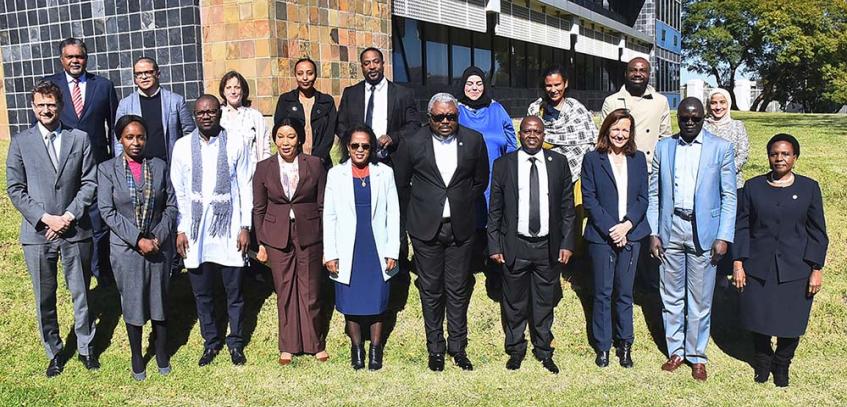The Stakeholders’ Consultation Meeting (SCM) of the African Governance Architecture Support Project (AGA-SP) was hosted by the Pan-African Parliament (PAP) at its seat in Midrand, South Africa, on June 13, 2023. The meeting provided an opportunity for a mid-term project evaluation with a view to providing critical input in the design of a similar project in the future.
Following a thorough review of the progress, gaps, and milestones of the AGA SP as well as lessons learned, the SCM resolved to re-orient the strategic direction of the project to align with African Union (AU) institutional reforms and the most pressing issues facing the African continent. The meeting therefore identified democratic governance, peace, and security as key priority areas going forward.
Emphasizing the need to focus on strategic thematic and sectoral-based programmatic and priority activity interventions that are transversal in nature and approach with clear results and impact, the political consultation of the AGA-SP made several recommendations regarding the next stage of a future project. These include the necessity to enhance citizens' civic engagement, participation, and inclusion. The SCM further highlighted open governance, transparency, accountability, and access to information as essential components of a future partnership.
The SCM involves all political heads of organs of the five AGA Platform members, namely the African Commission on Human and Peoples’ Rights (ACHPR), the Pan-African Parliament (PAP), the African Peer Review Mechanism (APRM), the African Court on Human and Peoples’ Rights (AfCHPR), and the Committee on the Rights and Welfare of the Child (ACERWC).
The AGA-SP is part of the partnership and collaboration between the African Union (AU) and the European Union (EU). It is implemented through two main modalities: (1) a grant component and (2) technical assistance (TA). Other non-grant recipient AGA Platform members that have benefited from the TA component are the AGA Secretariat, ECOSOCC, and the Democracy and Electoral Unit (DEAU) of the Department of Political Affairs, Peace, and Security (PAPS), African Union Commission.
As part of efforts to enhance coordination and synergy amongst all project stakeholders, Expertise France, responsible for implementing the Technical Assistance (TA) support to the five AGA Platform Members, has operationalized a two-tiered governance structure for the project, namely the Technical Oversight Committee and the Stakeholder Consultation Meeting.
The operationalization of the project governance structure has created a major avenue for stakeholders to meet at both technical and policy levels to review progress, exchange ideas, and learn lessons from each other in the context of the implementation of the AGA-SP.
The African Governance Architecture (AGA) is inspired by the Constitutive Act of the AU, which expresses the Union’s determination to ‘promote and protect human and people’s rights, consolidate democratic institutions and culture, and ensure good governance and the rule of law’. The principal objective is the implementation of AU shared values, in particular the African Charter on Democracy, Elections, and Governance (ACDEG).
The AGA is a platform for dialogue between the various stakeholders who are mandated to promote good governance and strengthen democracy in Africa, in addition to translating the objectives of the legal and policy pronouncements in the AU Shared Values.
In her welcome remarks, Hon. Lucia Dos Passos, 3rd Vice President of the Pan-African Parliament, highlighted the significant role played by the AGA-SP in accompanying AU organs, mandated to promote good governance and strengthen democracy in Africa, to deliver on their mandates. She called for enhanced commitment, refocusing of resources, and rethinking of coordination to ensure the project meets its envisaged targets.
Commissioner Rémy Ngoy Lumbu, Chairperson of the African Commission on Human and People’s Rights (ACHPR) and Chairperson of the AGA Bureau, called for an improved structural mechanism to enhance the coordination of the project. He described the SCM as an opportunity to engage with the European Union Delegation in cross-learning and obtain clarity on their expectations regarding project delivery so far and plans for the future of AGA-SP.
Ms. Maria Tronconso, Head of Governance, Peace, and Security at the EU Delegation to the African Union, said that this year’s SCM, hosted by the PAP, is a testament to the growing collaboration between the African Union and the European Union through the AGA-SP. She indicated that the EU's support for the AGA Platform would shift more significantly to programmatic and transversal activities that contribute to results and impact.
The SCM was preceded by the fourth Technical Oversight Committee (TOC) meeting of the AGA-SP. The TOC focused on creating a learning platform where project stakeholders shared successes and challenges in implementing their respective grant subventions. Specifically, the TOC looked at experiences of best practices that would enable the utilization and uptake of lessons for the successful implementation of the remainder of the project.
In this regard, Ms. Lindiwe Khumalo, Technical Head of the AGA Bureau, briefed the SCM on the outcomes of the TOC consultations for guidance and strategic direction by political heads of organs. Among the issues brought to the SCM’s attention, Ms. Khumalo noted the need to strengthen citizen engagement, coordination, and communication among organs.
"The meeting acknowledged the progress made by all project beneficiaries in the project's four broad outcome areas. Some of the notable accomplishments include the enhanced visibility of the organs and the AGA Platform on key norms and instruments, joint actions, thematic linkages, harmonization of CSO accreditation, digital platforms, joint communication campaigns, and investment in knowledge generation and sharing," said Ms. Khumalo.
Finally, a recommendation was made to designate specific organs to lead the implementation of AGA-wide transversal initiatives in the short term. This is to cater for the current operational, capacity, and technical challenges facing the AGA Secretariat, which is meant to be the overarching coordination entity in terms of leadership and coordination of transversal AGA-SP initiatives. In the meantime, efforts will be made to strengthen the role of the Secretariat to ensure it is fit for purpose to lead the coordination in the longer term.
-Ends-








